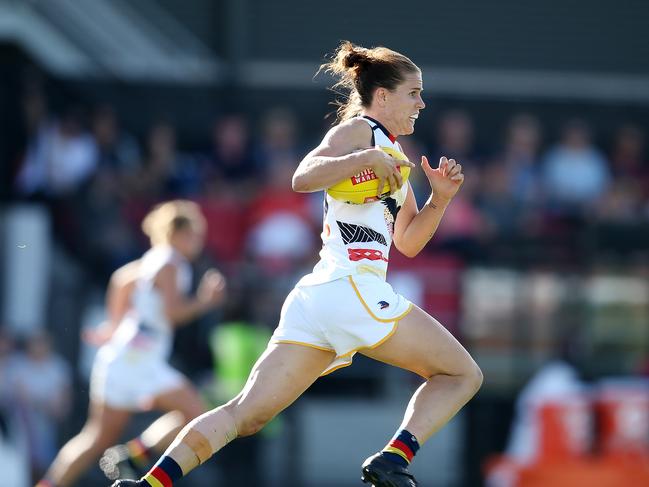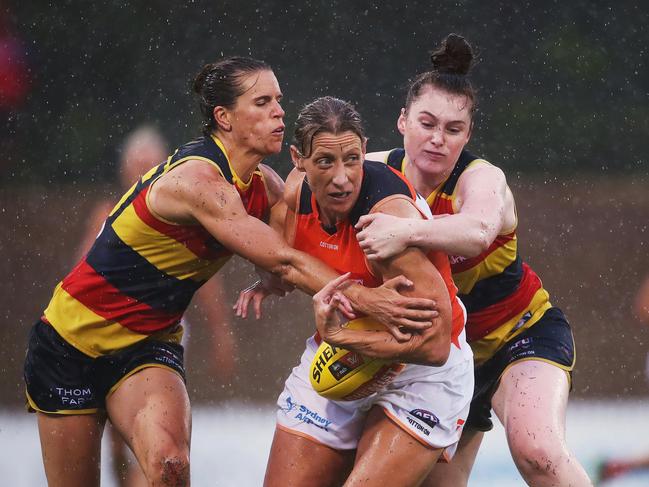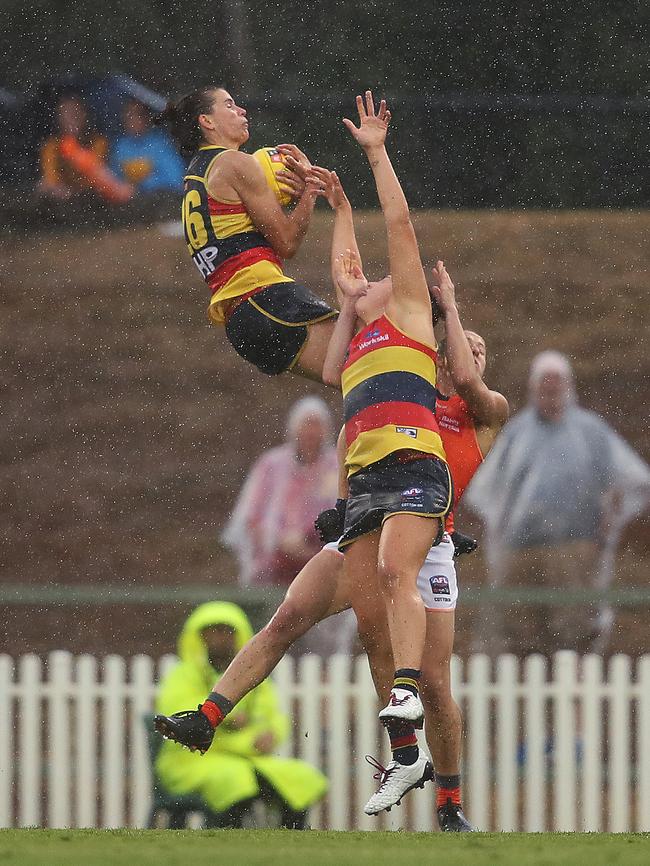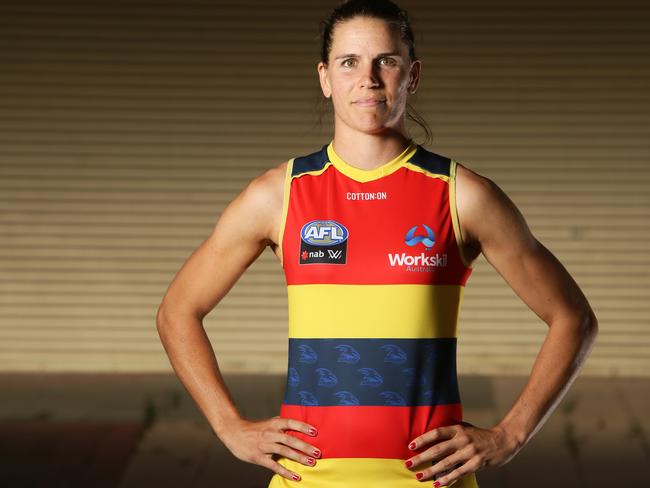How Chelsea Randall went from being ridiculed to All-Australian AFLW captain
ADELAIDE Crow Chelsea Randall has had the last laugh, going from being ridiculed and laughed at to All-Australian AFLW captain and being recognised as the most courageous player in the competition. Now she is driving a new generation of women’s footballers.
THE first time Chelsea Randall played a real game of football is a day burned in her memory – and maybe someone else’s as well. The Crows AFLW star had been watching brother Scott play for the Safety Bay Stingers in Western Australia when she was asked to fill in for the under 11 boys’ team. The coach had watched her kicking the ball with her dad and must have liked what he saw.
“So I did,” Randall recalls.
Backed by boundary umpire dad Brett, teammanagermumLinda,and grandmother Rose, she lined up opposite the boys before the game – and was roundly mocked.
“We lined up facing the opposition and they just started staring, laughing and pointing at me because they’d never seen a girl play football before, so they treated me like I was a bit of a joke,” she says.

That was a mistake.
“I really wanted to have a go at the game and I thought ‘if you’re going to welcome me like this, then I’ll pick on the one who is laughing the hardest’. So I tackled him to the ground and pinned him holding the ball. I’ll remember that forever because there was a part of me that said, as an immature kid, ‘I told you so’.”
Randall’s path was set from the moment her opponent hit the deck.
It took guts to stare down those boys, and courage is a word that has come to epitomise the footballer. It drives the 26-year-old, on the field and in life, and is now inspiring her to help produce a new generation of female footballers who will never be laughed at and ridiculed, as she was 15 years ago.
“I believe we all have great courage inside of us, that we are stronger than what we sometimes think,” Randall says. “But, sadly, that inner courage doesn’t always come out in us and, for whatever reason – and it is often because of society expectations and peer pressure – it can result in people not chasing their dreams.
“For young girls, in particular, they have a difficult enough time of trying to discover who they are without society suggesting who they should be.
“My philosophy is to not be scared of your dreams, to embrace them, and try to be the very best version of who you want to be.”
Randall is speaking from experience. She has been there, done that.
The Adelaide Crows star – named AFL Women’s All-Australian captain this year – has beaten the odds to become a role model for young female footballers. And she is doing everything in her power toensure they have an easier path to playing Australian football.
The Crows co-captain, with former Australian Olympic basketballer Erin Phillips, was named the AFLW’s most courageous player in both seasons of the competition, and is Adelaide’s community programs officer for female football.
She is spending much of the AFLW off season taking the game to schools and clubs, getting more girls and young women involved in the sport and encouraging them to chase their dreams, no matter the obstacles.
Born in Rockingham, an hour south of Perth, she continued to play with the Stingers’ under-age boys’ teams before being promoted to the club’s open-age women’s side at 14, where she went head to head with players twice her age.
When Randall finished school at 17, she joined WA Women’s Football League club Swan Districts and, after accepting a job in the remote mining town of Newman, in the Pilbara region of WA, she would drive 13 hours down the dusty desert highway to play a weekend game of footy.

After playing some exhibition matches for Melbourne, Randall was selected by Adelaide as a marquee player, prior to the inaugural AFLW draft two years ago.
But until the bright lights of the national women’s competition, Randall says she continually dealt with criticism and questions about why she was playing a supposed men’s game.
“It hasn’t been an easy journey, that’s for sure, being teased or laughed at because you play a game that you love,” she says. “Sometimes you question yourself and think, ‘maybe there is something wrong with me’. But I’ve always been the type of person where if someone told me I couldn’t do something, I used that as motivation to prove them wrong.
“There was a time when I kept it pretty quiet that I played footy because I was scared of what people’s opinions might be and I didn’t want to be ridiculed for it. So I just tried to let my footy do my talking and, if people were watching me, maybe I could help change their opinions just by the wayI played.”
Randall’s biggest inspiration was her grandmother, who demanded she stopped listening to the doubters and instead focus on one three-word phrase: make it happen.
“Until she passed away in 2014, grandma had never missed a game that I played,” she says. “She had a massive influence on me and every time I questioned whether I could do something, she would say stop talking about it and make it happen.
“Her advice was if you think you can’t do something, simply take off the ‘t’ and ‘you can’. She was fairly blunt but her point was that many people spend their lives dreaming or coming up with some fantastic ideas but never follow through with them because they keep making excuses. So I am really happy and humbled that grandma helped me make my dreams become a reality.” The “make it happen” motto has become so important to Randall that she has the words tattooed on her left forearm. “I’m very proud of the human being that I’ve become and I’ve got footy to thank for that, because you are only as good as the people you surround yourself with,” she says.
“Footy has given me an environment of some great leaders and people to follow, including our coaching staff and our men’s team at the Crows and their captain, Taylor Walker, so I’m forever grateful to the game.”
But injury almost ruined Randall’s football career before it really took off. Her Crows premiership coach, Bec Goddard, vividly remembers hearing her screams from the other end of the ground when the pair first encountered each other in a national championship match at Fremantle Oval in 2009. Randall was representing WA against Victoria while Goddard – who quit Adelaide after season two of the AFLW to return to Canberra to devote more of her time to her long-held role with the Australian Federal Police – was umpiring.
“And I thought that would be the end, that we wouldn’t see this kid play football again,’’ Goddard says. “She had snapped her ankle – I mean really snapped her ankle. It was one of those ones where you knew straight away that it was bad.
“When kids have injuries like that, especially teenage girls, it is quite traumatising and you rarely see them come back from something so significant. I’d heard these rumours about this Chelsea Randall girl being an absolute freak and I was looking forward to watching her play, but she only lasted about five minutes. The injury was one of the worst I’d seen and I thought ‘that’s it; we won’t see her again’.”

But, true to her trademark courage and determination, Randall did come back.
Within four days of having her left ankle rebuilt – “I had eight screws and a plate inserted to hold it together,” Randall says – she attended the All-Australian presentation in a wheelchair and was carried on to Subiaco Oval by her dad and state coach to accept her first AA medal. Her recollections of the horrific injury – a break and dislocation – remain vivid.
“I went up for a mark and got tunnelled, landed heavily and it just snapped,” Randall says. “As bad as the injury was, it was exaggerated by the fact that I was acting captain, the youngest WA skipper ever, and the match was all over very quickly for me.
“It was four days before my 18th birthday, so I had to celebrate in a wheelchair.
“At the time, as an 18-year-old, you think your world has caved in and the thought went through my mind that I might not be able to run again. But those thoughts quickly changed and I was able to convince myself to be patient, which isn’t usually a word in my vocabulary, and just let my body heal.
“Within a few months, the moon boot came off and away I went.
“Looking back, it was one of those things that just made me stronger because I’ve been able to call on some of those experiences to help me get through some tough times in theyears ahead.”
Despite the horrific injury, Randall not only got back on the field but has carved a reputation as the bravest player in the women’s game.
Significantly, her “most courageous” awards were voted on by her peers. Goddard describes utility Randall’s accolades as a no-brainer. “Without a doubt she is the most courageous player in the competition,” Goddard says.
“Not only has she come back from an injury that would have ended the careers of a lot of young players, but she puts herself in a situation in every game where she is likely to get hurt again.
“She does it because she always puts other people, her teammates, first and leads by example. Her type of leadership is very rare. As Napoleon Bonaparte said, a leader is a dealer in hope, and Chelsea every week gives her teammates hope that they are going to play well and win.”
Randall has always dealt in hope. The 173cm dynamo, who was a runaway winner of last season’s Crows club champion award and shared the AFL Coaches’ Association Player of the Year award with the Western Bulldogs’ Emma Kearney, wants to break down the barriers that young girls – many who idolise her – face in taking up a sport that was traditionally a male domain.
While Randall fought a tough battle to play the game, Kearney, who has now joined North Melbourne, was forced to give up the sport at the age of 12 for five years, when she was barred from playing with her local country boys’ team.
“I have a vision for women’s footy and that is that any girl, no matter what age they are, can pick up a football, join a local team and feel included, embraced and have a sense of belonging with a football club,” Randall says.
“That’s all we want in humanity, to have that sense of belonging and purpose in life. We are starting to see it with women’s footy but there is still some work to do.”

In this, as she is on the field, Randall is a leader. Having inked a one-year contract extension with the Crows to play under new coach Matthew Clarke, she has been instrumental in developing and growing Adelaide’s successful Crows Cup program.
She estimates that by the end of the AFL season, she would have been involved in running 23 football carnivals and clinics for 5000 kids, including those in country areas. Randall also has taught the sport to older international students at Thebarton College and seen four of them join the Adelaide Lutheran Football Club, while two signed with Salisbury.
“They are loving the game and sent me text messages of themselves in their new uniforms,” she says. “It just shows that there is a fully fledged pathway here in South Australia for anyone, regardless of gender, religion or background, to be able to play our great game.”
When it comes to the growth of the game for women, she likes what she sees. The numbers back her up. Two years ago, there were 2741 women’s players registered in SA. Now there are 6738. And the number of SANFL junior teams has gone through the roof, from 16 in 2016 to 98 this year.
The number of teams is growing at the top level as well. She backs the expansion of the AFLW from eight to 10 teams for the 2019 season, with North Melbourne and Geelong the newcomers. “As a player, you just want to play more games, and hopefully this will enable us to do that,” she says.
How big can the AFLW become? “As big as people’s imaginations can take it,” she insists. “It took 150 years of men’s footy to expand to an 18-team national competition, so we’ll see how things unfold with women’s footy. The first thing we have to do is to continue to grow the game from underneath so that there are enough talented young players coming through, to ensure the competition stays at a high level. Do that and women’s footy can be as big as it wants to be.”
And that needs something Randall says she didn’t have as a kid: sporting role models. Yes, she acknowledges, she is now one of them. “When I was being teased as an 11-year-old, my grandma was the one who encouraged me to keep going, saying ‘don’t worry, pull your socks up and get back out there’,” she recalls.
“And my dad and brother kept encouraging me to play, which was pretty cool. These days I guess every AFLW player would be a role model for either their own families, in their local communities or the wider football landscape.
“I have nieces who are now playing the game and saying they want to be like Aunty Chelsea. Others come up to me and say they want to follow in my footsteps, which shows how far girls football has come.”
Randall says she takes a lot of pride from that and hopes her story encourages other girls to play. “I’m hopeful that in a couple of years, young girls and boys will be able play this great Australian game alongside each other, that no one will be made fun of and there will be a genuine respect for all combatants. That would be awesome.” ●

